|
 Library
director Mike Starasta introduced Donath. Starasta said it was the
kickoff of sesquicentennial celebrations this year. Library
director Mike Starasta introduced Donath. Starasta said it was the
kickoff of sesquicentennial celebrations this year.
Something Starasta said the library is trying to form is a Friends
of the Library group, which is something that was in existence years
ago. It will be a 501C3 organization and benefit the library by
being a source for obtaining grants. He said the organization will
also have volunteers who can be the eyes and ears of the community
giving the library guidance on what the community needs.
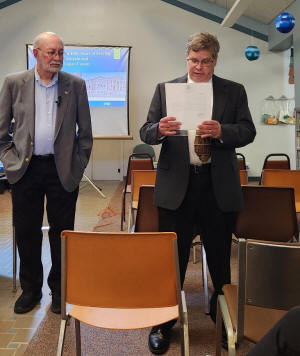
Before handing the floor over to Donath, Starasta
read a letter the library had received from Governor JB Pritzker
congratulating the library on celebrating 150 years.
As he began his presentation Donath said he has been a Lincolnite
since 1946. The library has figured into his life many times over
the years. When Donath was a student at Washington Monroe many years
ago, he recalls going to the library with his class and filling out
a requisition for a library card. He would often ride his bike there
and get the five books he was allowed to check out, then return a
few days later to get more books.
As Donath got older, he found the library was a good place to relax
and study with fewer disturbances than he would have at home.
Now, Donath uses the library for historical and genealogical
research and has written four books. One book was on the civil war,
another was the dead from the civil war, the third talked about
World War II generosity, and the most recent one is a book about the
1918 Spanish flu and its effect on Logan County.
Next, Donath asked if anyone knew how many locations the library had
been in. Only a couple people correctly guessed five.

The first article Donath was able to find about the
library was in a Lincoln Herald Newspaper from April 1874. The
impetus was for starting the Lincoln Public Library was the
temperance movement. The library and reading was considered an
alternative for people going to salons, pool halls and barber shops.
Plans for the library were discussed in a series of meetings of a
group headed by Colonel R.B. Latham, who served as president of the
group and Professor D.M. Harris who was the secretary. Capital stock
was $5,000 and would be divided into $10 shares.
A posting in the April 23, 1874, Herald said “Each holder of a share
pays two dollars in annual dues and is entitled to one vote.” The
fixed rate for a lifetime membership was $50. Those who just wanted
a yearly subscription paid three dollars. For a “quarterly
subscription” they paid “a dollar and twenty-five cents.”
Additionally, stockholders would choose six directors. The goal was
to raise $1,000. As the Herald said, “An organization is to be
affected as soon as one thousand dollars of stock have been
subscribed.” To raise these funds, Donath said they appointed
several ladies.
The original Lincoln Library Association drafted a preamble for a
constitution of their association. The preamble read as follows:
“[w]e, the subscribers, citizens of Lincoln Illinois, do hereby
associate ourselves together under the laws of Illinois
incorporating such Associations for the purpose of establishing in
this city a public library and reading room.”
The Library Association adopted a constitution for the library,
which Donath said had several legal sections. The articles and
sections in the constitution provided guidelines regarding shares
and stockholders, membership, officers, and meetings.
Article six of their constitution stated that “the board of
directors shall appoint a librarian, specify the duties of the
office, fix the compensation, and require the person so appointed to
give security in whatever sum they deem sufficient, for the faithful
discharge of the duties of the office” (April 30, 1874, Lincoln
Herald).
To amend the constitution, it would require a vote of “two-thirds of
the Association present at its regular meeting, provided that
written notice of the same shall have been given to the board of
directors at least one month previous.”
On April 30, the association held another meeting in which “the
committee of ladies appointed to solicit subscription reported 144
shares ($1,440) taken.” The committee was to report the next week at
their meeting.
One way Donath said they raised funds for furnishing the library
rooms was through social entertainment. The charge to get in was
twenty-five cents. The first one was in Hoblit and Foley' Law office
and included singing, recitations, charades, and reading of a
Shakespearian work.
It was exactly 150 years ago this week the library was incorporated
on May 18th, 1874. There was a group of eleven men and women
involved in raising the funds. Donath said the women played a big
role in raising the funds.
The library was set to open in August of 1874 it started with
donated books. The August 20, 1874, Lincoln Herald said, “Between
six and seven hundred books are on the shelves” and felt the
selection of books was “well done.”
In his research, Donath found information about a May 1875 meeting
to review the success of the first year of the library. The Herald
article said around 75 to 100 books were being checked out every
week. To purchase more books, they needed $500. At that time one
committee selected books. Donath said 660 volumes were purchased by
A.M. Miller and 56 books were donated. The expense of books was
$826.55 and $1300 worth of shares had been purchased.
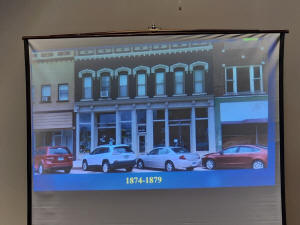
The library’s first location was in the upstairs of
two stores ran by John Lutz and Ed Burton. Robert Latham owned the
buildings and he let the library have the space rent free for 18
months.
To get to the library people had to go up the stairs through an
entrance between the two stores. Donath’s research shows the stores
were at 121 and 123 Kickapoo [which now house Deb’s Downtown Floral
and the Bee]. It was housed there from 1874 to 1879 and the Friends
of the Library continued to help raise funds for its upkeep.
[to top of second column] |

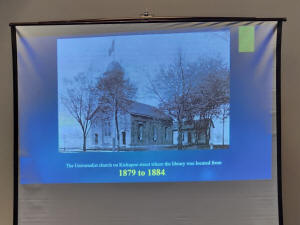
The next location was the site of the Universalist
Church on Kickapoo. Donath said it is where Mel ‘O Cream is now
located. This location was the home of the library from 1879 to
1884.
The library then had somewhere between 1,350 and 1,411 books. Donath
said they let people display art, stuffed animal collections, a
geological collection, China sets and other objects to fill up the
space. The library would be able to have this space for five years
if they would repair it, run gas into it and if they kept it in good
repair while they had it. They figured the cost for the upkeep would
be around $300.
A July 24, 1879, article said “what is needed most is for some
public-spirited citizen to will the institution several thousand
dollars in good, solid cash, and then at once become his own
executor, in order that there may be no doubt of its being rightly
applied to the intended use.” Even residents and patrons bringing
change in would help.
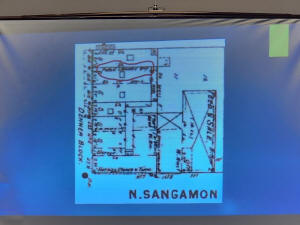
By looking at a map Donath found during his research,
he said in 1896 the library may have been located at 416 Broadway
what was called the Dehner Block. The Dehner block Donath referred
to is near Sangamon Street. Donath is not quite sure how long the
library was at this location, but it may have been there between
1896 and 1902 “depending on where the rent was cheapest.”
In 1890, Donath said the association started having financial
trouble as some of the stockholders died and others moved away.
Once the association started having troubles, Donath said A.M.
Miller asked the Lincoln City Council if they would put $200 per
year towards the library to cover this shortage. In addition,
several ladies hosted a winter fair, which raised $400.
Soon the library association started negotiating with the city to
take over the library and had a $500 budget. In 1895, Robert Latham
died. Donath said when Latham died his influence and money were
gone.
At that point, the library had 9,000 volumes. By May 1895, the
library was able to get space in City Hall on McLean Street.
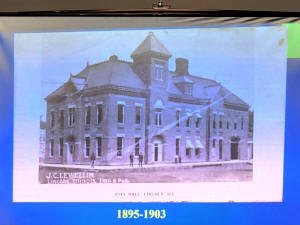
Donath said the space the library used was on the 1st
floor. It was 23 by 48 feet in dimension and lit by 8 windows. The
entrance was in the center of the building, but not connected to or
accessible through City Hall.
Next, Donath mentioned several dates that were important to the
history of the library. For instance, in 1897, Miss Isabel Nash left
her entire estate including her home to the library. In 1899, Mrs.
Louise Scully gave $2,000 in her will, but the stipulation was only
the earned interest could be used to buy books.

In 1901, Donath said the library started working
towards what would be their current location. It was then that the
Lincoln City Council and mayor W. O. Jones were able to secure
$25,000 from Andrew Carnegie. Local judge Steven Foley contributed
$5,000. In 1903, the library’s current location on Pekin Street was
built and donated.
To help acquire the monetary gift needed Judge Stephen Foley shared
his history of the plan. Donath said Judge Foley asked Mayor Jones
to call a council meeting to discuss the plans. Foley then laid out
the plans for a gift and resolutions and ordinances regarding the
library. Foley paid for Mayor Jones to take a trip to New York to
talk with Carnegie and request the funds needed to build the
library.
Two of the libraries’ original librarians were Ida Webster and Lula
Hayes. Donath said Webster had no training but spent time teaching
herself to categorize the books.
The research Donath has done ended in 1900. As he said in the Spring
2021 issue of the Logan County Genealogical and Historical Society
Newsletter Roots and Branches, “[p]erhaps this 19th Century history
of the Lincoln Public Library will inspire another researcher to
write the next chapter of the library history.”
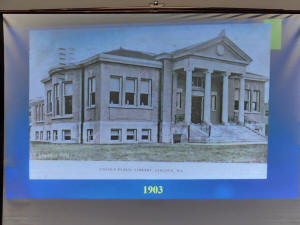
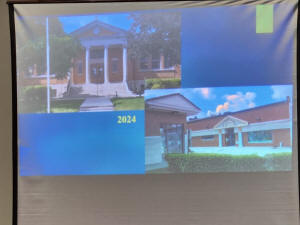
Since 1903, Lincoln Public Library has been on Pekin
Street. It now consists of the main library building and an annex
behind it. Donath was not sure when the annex was built.
Starasta said he believed the annex was built in 1960 and purchased
in 1995. Former Director Richard Summerall said the annex had its
opening in 1995.
Over the summer, there will be more events to mark the 150th year of
this important place in Lincoln. There is a sign up sheet for the
Friends of the Library at the front desk.
[Angela Reiners]
 |